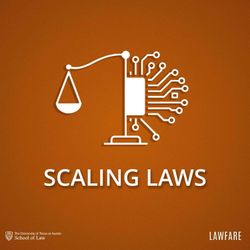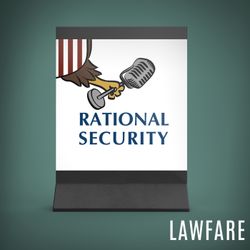Share

The Lawfare Podcast
An Update on Electoral Count Act Reform
After months of mostly quiet, behind-the-scenes debate, both the House and Senate seem ready to move forward with reforming the Electoral Count Act, the 1887 statute governing how Congress counts electoral votes, whose various ambiguities played a central role in unsuccessful plans to turn the 2020 election results in favor of former President Trump. Experts are all but unanimous on the need to reform the law, and both proposals have at least some bipartisan support, including from Senate minority leader Mitch McConnell. But the path forward remains far from certain.
To discuss what comes next, Lawfare senior editor Scott R. Anderson sat down with Ned Foley, a leading election law expert and professor at The Ohio State University's Moritz College of Law, and Genevieve Nadeau, a Counsel at the organization Protect Democracy who has been engaging on reform efforts. They discussed the similarities and differences between the House and Senate reform proposals, how they will strengthen our election process, and what work remains to be done.
More episodes
View all episodes

Scaling Laws: How AI Can Transform Local Criminal Justice, with Francis Shen
52:51|Alan Rozenshtein, research director at Lawfare, spoke with Francis Shen, Professor of Law at the University of Minnesota, director of the Shen Neurolaw Lab, and candidate for Hennepin County Attorney.The conversation covered the intersection of neuroscience, AI, and criminal justice; how AI tools can improve criminal investigations and clearance rates; the role of AI in adjudication and plea negotiations; precision sentencing and individualized justice; the ethical concerns around AI bias, fairness, and surveillance; the practical challenges of implementing AI systems in local government; building institutional capacity and public trust; and the future of the prosecutor's office in an AI-augmented justice system.Find Scaling Laws on the Lawfare website, and subscribe to never miss an episode.To receive ad-free podcasts, become a Lawfare Material Supporter at www.patreon.com/lawfare. You can also support Lawfare by making a one-time donation at https://givebutter.com/lawfare-institute.
Rational Security: The “Scare Them When They’re Young” Edition
01:17:22|This week, Scott sat down with his Lawfare colleagues Tyler McBrien, Michael Feinberg, and Ariane Tabatabai to talk through the week’s big news in national security, including:“Between Iraq and a Hard Place.” Iran is engaged in perhaps its most serious bout of domestic unrest in a decade, spurred on by a failing economy and the seeming political weakness of the regime after its devastating military conflict with Israel and the United States this past summer. But the regime has struck back viciously, cutting off global media and communications access even as it has engaged in a vicious and violent campaign of repression that may have already led to as many as between 2,000 and 12,000 fatalities. That has led, among other things, to threats from the Trump administration that it may intervene militarily against the regime. What should we be making of this development? What does it mean for the future of Iran, and what role might the United States play in that future?“A Slippery Slope.” ICE’s increasingly provocative immigration enforcement actions came to a violent head last week in Minneapolis, when ICE agent Jonathan Ross shot and killed driver and possible protest participant Renee Good. While the White House has sought to frame Good as a “domestic terrorist” who threatened Ross, videos of the incident instead suggest that her conduct came nowhere close to the standard normally required for the use of lethal force. The FBI is now reportedly investigating Good’s widow for ties to activist groups, an effort that led several career federal prosecutors to quit this week. How effective are the administration’s attempts to shape the truth likely to prove? “Green with Envy.” Diplomatic representatives from Denmark and Greenland are meeting with senior administration officials as we record to discuss a way forward on Greenland, the self-governing and all-but-independent Danish territory that President Trump has openly coveted since returning to office, up to and including the threat of military force to acquire it. How serious should the world take these threats? Where is the competition over Greenland likely to lead?In object lessons, Tyler is setting the mood with a recommendation of Way Dynamic’s album “Massive Shoe.” Mike is boosting our moods with a preview of “One Movie After Another,” a retrospective of Paul Thomas Anderson films, coming soon to the AFI Silver Theatre in Silver Spring. Scott is setting some mood lighting with his Xenomorph-like bedtime reading light from Glocusent. And Ari is getting moody with a revisit of Pedro Almodóvar’s “Pain and Glory.”To receive ad-free podcasts, become a Lawfare Material Supporter at www.patreon.com/lawfare. You can also support Lawfare by making a one-time donation at https://givebutter.com/lawfare-institute.
Lawfare Daily: Entrepreneurial Federalism and the New National Security, with Ashley Deeks and Kristen Eichensehr
42:36|On today's episode, Lawfare Senior Editor Scott R. Anderson sits down with Lawfare Contributing Editor Professor Ashley Deeks of the University of Virginia School of Law and Professor Kristen Eichensehr of Harvard Law School to discuss their recent article entitled, "Federalism and the New National Security," recently published in the Harvard Law Review.Together, they discuss the new ways that states are engaging in national security policy (which Deeks and Eichensehr call "entrepreneurial federalism"), the costs and benefits of such practices, and strategies for how the states and the various branches of the federal government should engage with them.To receive ad-free podcasts, become a Lawfare Material Supporter at www.patreon.com/lawfare. You can also support Lawfare by making a one-time donation at https://givebutter.com/lawfare-institute.
Lawfare Daily: The U.S. Foreign Service at a ‘Breaking Point,’ with John Dinkelman
28:47|On today’s episode, Lawfare Managing Editor Tyler McBrien sits down with John Dinkelman, president of the American Foreign Service Association (AFSA), to discuss his organization’s latest report, entitled, “At the Breaking Point: The State of the U.S. Foreign Service in 2025.” They talk about why AFSA undertook such a project after the federal government workforce survey was canceled earlier in the year, the report’s major findings, and why a robust foreign service is vital to U.S. national security.To receive ad-free podcasts, become a Lawfare Material Supporter at www.patreon.com/lawfare. You can also support Lawfare by making a one-time donation at https://givebutter.com/lawfare-institute.
Lawfare Daily: The Latest in Iran, with Richard Nephew
53:40|Iran is once again witnessing large-scale protests, on which the regime is cracking down through mass arrests and deadly force. President Trump has stated that the United States would come to the rescue of Iranians if the regime continues to kill protestors. Meanwhile, Tehran continues to reconstitute its nuclear program, which was damaged during the 12-day war over the summer. President Trump has threatened to eliminate Iran’s nuclear and missile programs if Tehran does not stop rebuilding its capabilities. Iran’s regional standing remains diminished, though its relationships with Russia and China continue even as tensions create limits to cooperation. On today’s episode, Lawfare Public Service Fellow Ariane Tabatabai sits down with Richard Nephew, Senior Research Scholar at the Center on Global Energy Policy at Columbia University and former Deputy Special Envoy for Iran, to discuss the latest developments in Iran, take stock of U.S. policy toward Iran during President Trump’s first year back in office, and offer indicators for what to expect next.To receive ad-free podcasts, become a Lawfare Material Supporter at www.patreon.com/lawfare. You can also support Lawfare by making a one-time donation at https://givebutter.com/lawfare-institute.
Lawfare Daily: The Trials of the Trump Administration, Jan. 9
01:40:30|In a live conversation on YouTube, Lawfare Editor in Chief Benjamin Wittes sat down with Lawfare Senior Editors Roger Parloff Michael Feinberg and Eric Columbus to discuss the shooting by an ICE agent in Minnesota, what the Maduro indictment means for the Alien Enemies Act cases, the disqualification of the U.S. attorney for the Northern District of New York, and moreYou can find information on legal challenges to Trump administration actions here. And check out Lawfare’s new homepage on the litigation, new Bluesky account, and new WITOAD merch.To receive ad-free podcasts, become a Lawfare Material Supporter at www.patreon.com/lawfare. You can also support Lawfare by making a one-time donation at https://givebutter.com/lawfare-institute.
Lawfare Archive: Former Ambassador Roberta Jacobson on the Mexico Presidential Election
45:12|From June 18, 2024: On June 2, Mexico held one of the largest elections in its history and the electorate voted in the country's first women, and Jewish, president, Claudia Sheinbaum. Sheinbaum was endorsed by outgoing President Andrés Manuel López Obrador (AMLO), who critics charge as pushing a series of anti-democratic policies including a substantial judicial overhaul. To discuss this historic election and what President-elect Claudia Sheinbaum may do in office, Lawfare Associate Editor for Communications Anna Hickey sat down with former United States Ambassador Roberta Jacobson. They discussed the issues voters were concerned about, political violence by cartels plaguing the country, and whether Sheinbaum will follow AMLO's trajectory as a populist or chart her own path. To receive ad-free podcasts, become a Lawfare Material Supporter at www.patreon.com/lawfare. You can also support Lawfare by making a one-time donation at https://givebutter.com/lawfare-institute.
Lawfare Archive: A Jan. 6 Committee Staffer on Far-Right Extremism
57:19|From February 15, 2023: The Jan. 6 committee’s final report on the insurrection is over 800 pages, including the footnotes. But there’s still new information coming out about the committee’s findings and its work.Last week, we brought you an interview with Dean Jackson, one of the staffers who worked on the Jan. 6 committee’s investigation into the role of social media in the insurrection. Today, we’re featuring a conversation with Jacob Glick, who served as investigative counsel on the committee and is currently a policy counsel at Georgetown’s Institute for Constitutional Advocacy and Protection. His work in the Jan. 6 investigation focused on social media and far-right extremism. Lawfare senior editor Quinta Jurecic spoke with Jacob about what the investigation showed him about the forces that led to Jan. 6, how he understands the threat still posed by extremism, and what it was like interviewing Twitter whistleblowers and members of far-right groups who stormed the Capitol.You can read Jacob’s essay with Mary McCord on countering extremism here in Just Security and listen to an interview with Jacob and his Jan. 6 committee colleagues here at Tech Policy Press.To receive ad-free podcasts, become a Lawfare Material Supporter at www.patreon.com/lawfare. You can also support Lawfare by making a one-time donation at https://givebutter.com/lawfare-institute.
Lawfare Daily: The Legal Fallout After a Fatal ICE Shooting in Minneapolis
40:57|Lawfare Senior Editor Anna Bower speaks with fellow Senior Editors Eric Columbus and Mike Feinberg about the fatal shooting of Renee Nicole Good by an ICE officer in Minneapolis. The discussion covers what is currently known about the incident and the conflicting accounts offered by DHS and the White House in contrast with bystander video. The panel also discusses DHS use-of-force policies, the federal government’s reported investigation of the shooting, and the legal framework governing state prosecutions of federal officers.To receive ad-free podcasts, become a Lawfare Material Supporter at www.patreon.com/lawfare. You can also support Lawfare by making a one-time donation at https://givebutter.com/lawfare-institute.